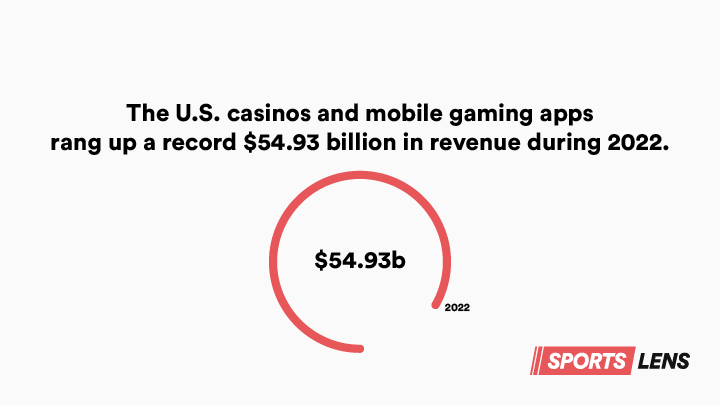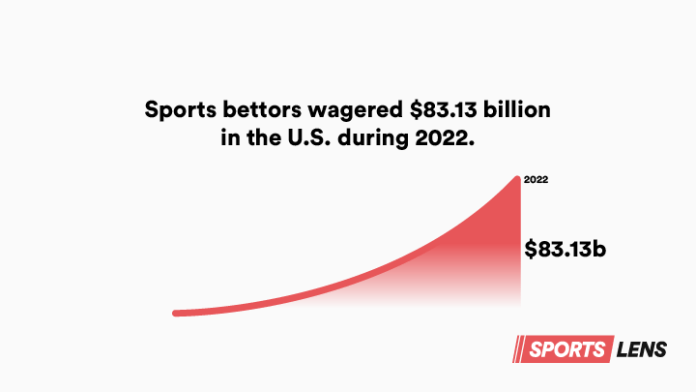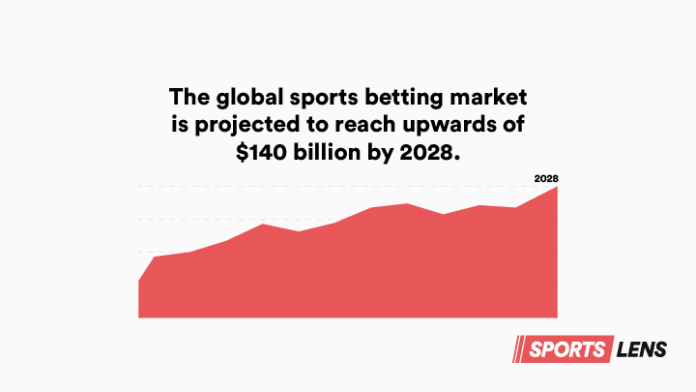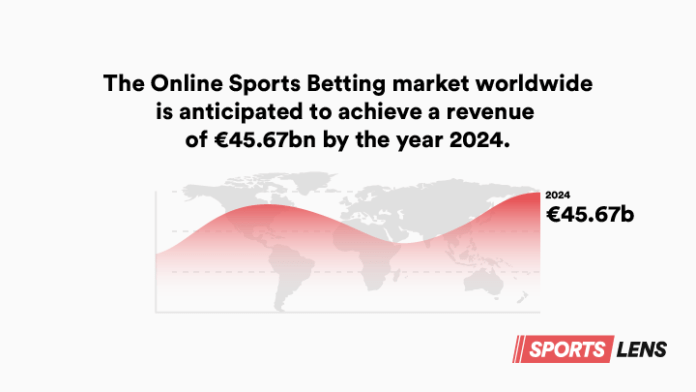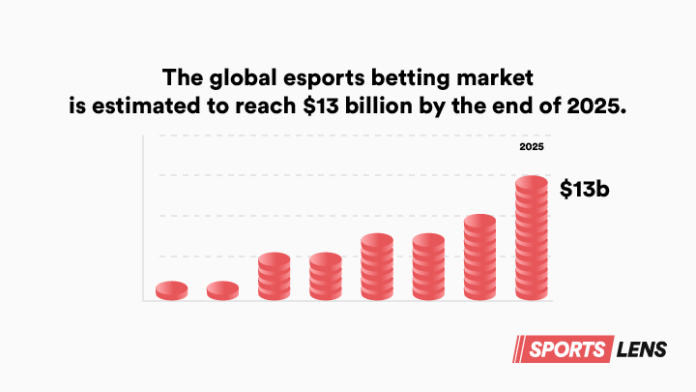In the dynamic realm of sports, betting has emerged as a cornerstone, as integral to the fan experience as the game itself. Gone are the days when sports betting was merely a casual pastime for the enthusiastic fan; today, it stands as a colossal industry, intertwining the fate of teams and players with the fortunes of millions worldwide. This transformation is not just about predicting the outcomes of games. It involves navigating a complex, ever-evolving market that spans continents, cultures, and currencies. From the local bookie operating at the corner of the street to sophisticated online platforms that connect bettors across the globe, the spectrum of sports betting is as broad as it is deep.
This article embarks on a journey into the heart of sports betting and gambling statistics, dissecting its prevalence, and impact, and tracing its rapid evolution. We will explore not just the sheer scale of sports betting, but also the nuances that define its place in the sports industry. How has the digital revolution transformed the way we bet? What are the most popular sports that attract wagers, and why? How do changes in legislation across different jurisdictions influence the market dynamics? And importantly, what are the emerging trends that could shape the future of sports betting?
As we delve into these questions, we will uncover the intricate relationship between sports betting and the broader socio-economic landscape. The legalization of sports betting in various parts of the world, most notably in the United States with the repeal of the Professional and Amateur Sports Protection Act (PASPA) in 2018, has not only opened new markets but also raised questions about integrity, addiction, and the social responsibilities of the betting industry. Meanwhile, the advent of new technologies, from mobile betting apps to blockchain-based platforms, is redefining what it means to place a bet, offering both opportunities for innovation and challenges for regulation and oversight.
Editor’s Picks
- Increase in revenue: The U.S. casinos and mobile gaming apps rang up a record $54.93 billion in revenue during 2022.
- Total wagered: Sports bettors wagered $83.13 billion in the U.S. during 2022.
- Future projection: The global sports betting market is projected to reach upwards of $140 billion by 2028.
- Main US event: The 2023 Super Bowl counted around $16 billion wagered by a record 50.4 million Americans.
- Tax Revenue: New Jersey, one of the first states to legalize sports betting post-PASPA, reported over $50 million in tax revenue from sports betting in 2020
- Worldwide most wagered sport: Soccer dominates globally, with the FIFA World Cup generating an estimated €136 billion in 2022.
The Scale of Sports Betting
The sports betting industry has experienced a meteoric rise, transforming from a niche hobby to a global economic powerhouse in just a few short years. This growth is not just impressive in its scale but also in the speed with which it has reshaped the landscape of sports and entertainment.
Here, we delve deeper into the statistics that paint a picture of this booming industry:
- The U.S. casinos and mobile gaming apps rang up a record $54.93 billion in revenue during 2022.
The U.S. casinos and mobile gaming apps rang up a record 54.93 billion in revenue during 2022 - Slot machines and tables generated the most revenue out of any other form of gambling in 2022 with $43.79 billion. A 6.7% increase over 2021.
- Sports bettors wagered $83.13 billion in the U.S. during 2022.
Sports bettors wagered 83.13 billion in the U.S. during 2022 - Sportsbooks only generated $6.56 billion of total wagers in 2022, but it’s a 65.4% increase over 2021.
- Nevada broke the 2021 historic revenue record of $13.4 billion by November 2022.
- The global sports betting market size is projected to reach upwards of $140 billion by 2028.
The global sports betting market is projected to reach upwards of 140 billion by 2028 - The compound annual growth rate (CAGR) for the global sports betting market is estimated at 10.1% from 2021 to 2028, reflecting the industry’s robust and sustained expansion.
- Online sports betting platforms’ share of the total market is increasing year over year. In 2020, online wagers accounted for approximately 70% of all sports bets placed in the U.S., a trend mirrored in many parts of the world.
- The repeal of PASPA in 2018 was a watershed moment for the industry in the U.S., leading to a domino effect of legislative changes across the country. As of early 2023, over 38 states have legalized some form of sports betting, with several more considering legislation.
- Internationally, countries such as the UK, Australia, and parts of Europe have long embraced sports betting, with emerging markets in Asia and Africa contributing to global growth.
- Football (both American and soccer) remains the most popular sport for betting globally, but other sports like basketball, baseball, cricket, and even esports are seeing increasing betting volumes.
These statistics underscore the vast and dynamic nature of the sports betting industry. Its growth is propelled not just by changes in legislation and technology but also by the evolving tastes and preferences of consumers. As we look to the future, the sports betting industry stands at the forefront of entertainment, technology, and sports, promising even greater expansion and innovation.
Sources: Forbes, A statistical theory of optimal decision-making in sports betting, Grand View Research, Forbes.
Online vs. Offline Betting
The digital revolution has transformed countless industries, and sports betting is no exception. The distinction between online and offline betting is becoming increasingly pronounced, with each channel offering distinct experiences and advantages. Below, we explore the statistics that highlight the trends and preferences shaping the future of sports betting:
Online Bets:
- The Online Sports Betting market worldwide is anticipated to achieve a revenue of €45.67bn by the year 2024.
The Online Sports Betting market worldwide is anticipated to achieve a revenue of E45.67bn by the year 2024 - In 2020, mobile betting specifically saw a dramatic increase, with some reports indicating that up to 70% of online wagers were placed via smartphones, underscoring the importance of mobile accessibility in the online betting ecosystem.
- A 2021 survey found that younger bettors, particularly those aged 23-38, are more likely to place bets online, citing reasons such as ease of use, convenience, and the ability to shop for the best odds.
- Online bettors are also more engaged, with data suggesting they place bets more frequently and are more likely to participate in live betting (betting during the event) compared to their offline counterparts.
Offline Betting Adaptations:
- Traditional bookmakers and brick-and-mortar casinos are adapting rather than disappearing. Many have expanded their digital presence, offering online betting options alongside their physical venues.
- In markets where online betting is heavily regulated or restricted, offline betting continues to thrive, offering social experiences and atmospheres that online platforms can’t replicate.
- The emergence of hybrid models, where bettors can place wagers online but collect winnings in person, has blurred the lines between online and offline betting.
While online platforms continue to dominate the market, the persistence and evolution of offline betting highlight the diverse preferences of bettors. As technology advances and regulatory landscapes evolve, the sports betting industry will likely continue to see shifts in how and where bets are placed, with both online and offline channels adapting to meet the changing demands of consumers.
Sources: Statista, Gambling Commission, Gambling Commission
Most Popular Sports for Betting
The sports betting landscape is as varied as the sports themselves, with certain games drawing significantly more betting action than others. The popularity of a sport for betting often reflects its fan base, the volume of games or events, and its global appeal. Here’s a closer look at the statistics highlighting the most bet-on sports:
Football:
- Football, particularly in the U.S., commands a substantial share of the sports betting market.
- The NFL season, culminating in the Super Bowl generates the highest single-event betting volume annually.
- For Super Bowl 2023, the American Gaming Association (AGA) estimated that approximately $16 billion was wagered by a record 50.4 million American adults. This figure represents a significant increase from previous years, highlighting the growing popularity and acceptance of sports betting in the U.S.
- College football also sees significant betting activity, with the College Football Playoff National Championship and major bowl games attracting millions in bets.
Soccer (Football Globally):
- Soccer, known as football outside the U.S., is the world’s most popular sport for both viewership and betting. Global events like the FIFA World Cup and UEFA European Championship see massive betting volumes.
- The 2018 World Cup had a significant global betting turnover, estimated at €136 billion. The average match saw €2.1 billion in betting turnover, with the final match between Croatia and France generating an estimated €7.2 billion in betting turnover worldwide.
- The 2022 FIFA World Cup broke betting records, with a noticeable increase in betting volume compared to the 2018 tournament. Betting across the 2022 FIFA World Cup increased by 13% from the 2018 tournament.
- Domestic leagues such as the English Premier League, La Liga, and the Bundesliga also see significant betting activity throughout their seasons, with weekly matches providing a steady stream of betting opportunities.
Basketball:
- The NBA is a major draw for bettors.
- College basketball, especially during March Madness, with an estimated $15.5 billion U.S. dollars for 2023. A significant increase compared to the 2022 estimate of $3.1 billion U.S. dollars
Boxing and Mixed Martial Arts (MMA):
- High-profile boxing matches and MMA events, particularly those in the UFC, draw significant betting interest.
- Major fights can generate hundreds of millions in bets, with notable examples including the Mayweather vs. McGregor fight in 2017, which saw over $65 million in bets at Nevada sportsbooks alone.
Emerging Sports:
- Esports has rapidly emerged as a popular betting market, with major tournaments for games like “League of Legends,” “Dota 2,” and “Counter-Strike: Global Offensive” attracting significant betting volumes.
- The global esports betting market is estimated to reach $13 billion by the end of 2025.
The global esports betting market is estimated to reach 13 billion by the end of 2025 - Golf, particularly during majors like The Masters, U.S. Open, The Open Championship, and the PGA Championship, also see a notable amount of betting activity.
These statistics illustrate the diverse and global nature of sports betting, highlighting how different sports cater to bettors’ varied tastes and interests worldwide. As the sports betting market continues to expand, the range of sports attracting betting interest is likely to grow, reflecting broader trends in sports viewership and fan engagement.
Sources: AGA, FIFA, SBCAmericas, Statista, ESPN, PRN
The Impact of Legislation
The landscape of sports betting has been profoundly influenced by legislative changes across the globe, with laws either restricting or enabling the expansion of the industry. The repeal of the Professional and Amateur Sports Protection Act (PASPA) in the United States in 2018 stands as a landmark decision that has catalyzed the growth of sports betting across the nation. Below, we delve into the statistics and developments that illustrate the pivotal role of legislation in shaping the sports betting industry:
Post-PASPA Expansion in the U.S. and UK:
- According to the American Gaming Association, the market saw over $21 billion in total sports betting revenue in 2020 alone, a staggering increase from pre-PASPA years.
- The legalization across numerous states has led to a significant boost in tax revenue. For example, New Jersey, one of the first states to legalize sports betting post-PASPA, reported over $50 million in tax revenue from sports betting in 2020.
- In the United Kingdom, the Gambling Act of 2005 established a regulatory framework that has made sports betting a major industry, with the UK Gambling Commission reporting over £14 billion in total gross gambling yield in 2020.
Responsible Gambling and Integrity Measures:
- New Jersey requires sports betting operators to contribute to problem gambling treatment programs, and many states have set up self-exclusion lists that allow individuals to block themselves from placing bets.
- The MLB, NBA, and NHL have entered into data-sharing agreements with major sports betting operators to protect the integrity of their games.
The evolution of sports betting legislation around the world demonstrates a clear trend towards regulation and openness, with governments recognizing the potential economic benefits and the importance of safeguarding integrity and promoting responsible gambling. As the legal landscape continues to evolve, the sports betting industry is poised for further growth, albeit within frameworks that seek to balance commercial interests with the protection of players and the integrity of sports.
Sources: AGA, Forbes, Gambling Commission, New Jersey Department of Public Service, NHL.
Conclusion
Sports betting transcends the simple act of wagering on outcomes; it represents a multifaceted industry at the intersection of sports, technology, finance, and law. The evolution of sports betting reflects broader societal shifts, including the digital transformation of entertainment, the liberalization of gambling laws in many jurisdictions, and the growing acceptance of betting as a mainstream activity. Through statistical analysis, we have glimpsed the remarkable scale and dynamism of this sector, observing how it adapts and thrives amidst changing technological landscapes and regulatory frameworks.
Understanding the dynamics of the sports betting industry through comprehensive, up-to-date data is crucial for all stakeholders involved. For policymakers, it informs the development of effective and balanced regulations. For businesses, it guides strategic decisions and innovation efforts. For consumers, it enhances awareness and responsible participation. And for the sports themselves, it ensures that betting contributes positively to the fan experience without compromising the integrity of the game.
David Myers Gambling Content Editor
In 2023, David became a part of the Sports Lens team, bringing with him an impressive 25-year career that encompassed roles as both a writer and editor within the betting and casino sectors. His professional journey includes stints at esteemed organizations such as The Guardian, Racing Post, 888Casino, and Sky Sports Racing. Alongside his extensive industry experience, he holds a diploma in sub-editing and law. David's accomplishments extend beyond his editorial work, as he is also the published author of four books and continues to thrive as a highly accomplished sports tipster.In 2023, David became a part of the Sports Lens team, bringing with him an impressive 25-year career that encompassed roles as both a writer and editor within the betting and casino sectors. His professional journey includes stints at esteemed organizations such as The Guardian, Racing Post, 888Casino, and Sky Sports Racing. Alongside his extensive industry experience, he holds a diploma in sub-editing and law. David's accomplishments extend beyond his editorial work, as he is also the published author of four books and continues to thrive as a highly accomplished sports tipster.View All Posts By David Myers
